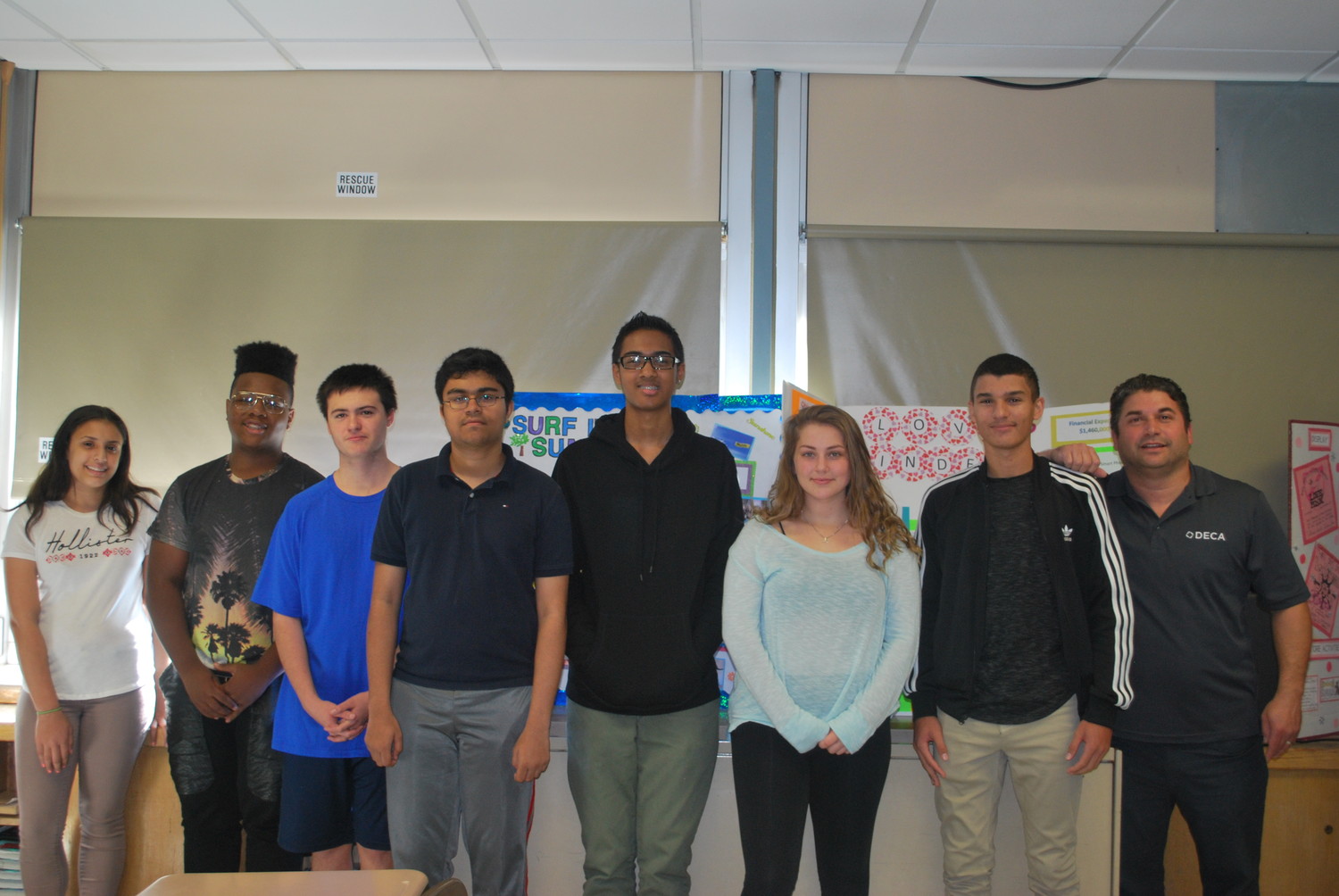For DECA Club, it’s all business
Lawrence High School students learn how to present and compete
Lawrence High School sophomore Malakih Durrant envisions a successful future. Durrant said he wants to own a restaurant, a gym or a real estate firm, and to become an attorney. He believes that being a DECA Club member will help him attain his dreams.
“Debating with people, persuading people — that’s what a lawyer does,” Durrant said, shortly after taking the DECA regional test on Nov. 1. “I like meeting new people. You would never think that a club like this exists in school.”
Since 2005, Lawrence High School business teacher Mark Albin has been the adviser of the school’s DECA Club, and for the last 12 years he has helped his students reach the organization’s top level of competition.
Founded in 1946 and originally known as the Distributive Education Clubs of America, the Reston, Va.-based group aims to prepare high school and college students — budding leaders and entrepreneurs — for careers in marketing, finance, hospitality and management.
DECA is a nonprofit with more than 215,000 members in all 50 states, the District of Columbia, Puerto Rico, Canada, China, Germany, Guam, Mexico and Spain. Congress, and the federal Department of Education and state, district and international of education departments authorize DECA’s programs. It is organized into two student divisions, each with programs that address the learning styles, interests and focuses of its members.
The High School Division has 200,000 members in 3,500 schools. The Collegiate Division includes more than 15,000 members in 275 colleges and universities. It offers competition in research and solving business problem through role-play scenarios on three levels — regional, state and international. In addition to competing and being judged by professionals, the students take rigorous exams at all three levels.
Lawrence High’s program began in the 1950s, Albin said, and had some success, but then the club’s popularity waned and so did its achievements. For a number of years, no Lawrence students reached the international level.
“We had to recruit kids,” Albin said. “We went from 10 people to standing room only in the Little Theater. Our numbers were great for a while, averaging 20 to 25. This year we have 13. It’s tough. You have to put in the time to be successful. It’s an academic club.”
Along with learning skills that include research, thinking on your feet and public speaking, Albin has also used the enticement of travel to drum up interest in the club. The April international conferences have been held in Anaheim, Calif.; Nashville, Tenn.; and Orlando, Fla., the past three years. The 2018 conference will be in Atlanta.
“You develop test skills for the SAT, conduct research and take part in role plays,” said Albin, who has taught for 21 years, 13 at Lawrence. “Going forward, for interviews for college and jobs, the skill set transfers well.”
Earlier this year, then sophomores Massimo Cancelliere and Harrison Kim qualified for international conference in Anaheim. They competed in the Fashion Merchandising Promotion Plan category. The duo placed sixth in the state competition, but did not medal at the international conference.
Cancelliere said they picked the category because it suited them, and they liked the idea of designing their own sneaker. “This club is different,” he said after taking the regional DECA test. “Not many of the other clubs offer the experience this one does. You have the chance to go places if you put in the work.”
Pushed by career and technical teachers Ruth Cohen and Mark Palladino, junior Amil Virani joined the club as a 10th-grader. “It helped me develop communication and client relationship skills,” he said, “and I understand how to adapt to different types of clients.”
Virani also took the regional exam on Nov. 1. “It’s competitive, and there are not many opportunities like [this],” he said, alluding to the chance for travel.
To help finance the trips, the club raises funds by selling snacks and water throughout the school year.
As students develop skills that they will use throughout their lives, Albin also gains from the relationships. “I get to keep in touch with the kids that come through here,” he said. “We go for lunch, have nice conversations, and it’s great to see them doing well and having great success.”

 44.0°,
Mostly Cloudy
44.0°,
Mostly Cloudy 




